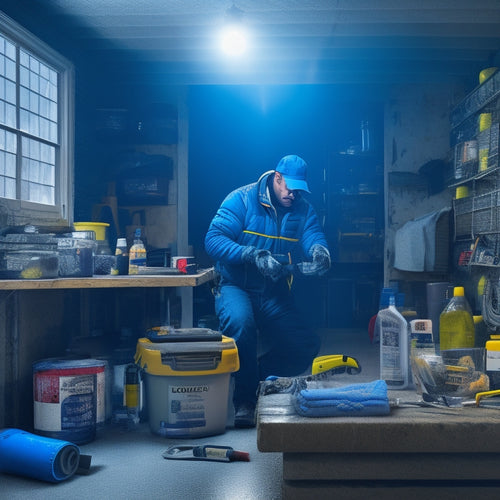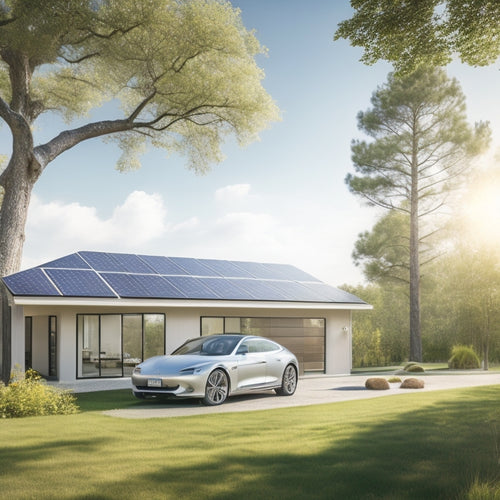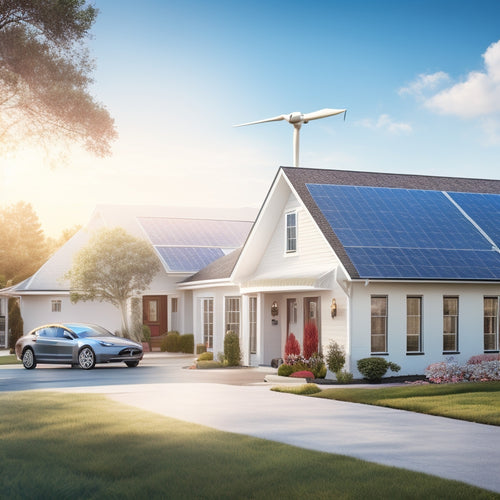
What Are the Top Home Solar Inverter Options?
Share
You're contemplating solar energy for your home and pondering the top inverter options. You've got a range of choices, from high-efficiency string inverters like SMA, Fronius, and Enphase, to advanced microinverters and power optimizers from brands like Tigo, Optimizer, and Huawei. Grid-tie inverters can assist you in selling excess energy back to the grid, while hybrid inverters combine grid-tie benefits with energy storage. With so many options, it's crucial to take into account factors like inverter efficiency, reliability, and compatibility with your solar panel system. As you delve deeper, you'll discover the key features and considerations that will help you make an informed decision.
Key Takeaways
• Top home solar inverter options include string inverters from brands like SMA, Fronius, and Enphase, offering high efficiency and real-time monitoring.
• Microinverters provide individual panel-level energy optimization, while power optimizers from brands like Tigo and Huawei ensure real-time monitoring and high efficiency.
• Grid-tie inverters maximize solar benefits, allowing homeowners to sell excess energy back to the grid, with low maintenance and high efficiency rates.
• Hybrid inverters combine grid-tie benefits with energy storage, providing a reliable backup power source and energy independence.
• Advanced inverter features like real-time monitoring, panel compatibility checks, and seamless system integration are crucial for optimal solar panel performance.
Top-Rated String Inverters for Homes
When selecting a string inverter for your home solar array, you'll want to explore options that offer high efficiency, reliability, and compatibility with your specific system configuration. A top-rated string inverter can greatly impact your home energy production, so it's important to get it right.
Look for inverters with high conversion efficiency, such as those from leading brands like SMA, Fronius, and Enphase. These brands offer high-efficiency inverters that can maximize your home energy production.
Additionally, ponder the inverter's compatibility with your solar panel array and system configuration. Make sure the inverter is designed to handle the maximum power output of your solar panels. You'll also want to take into account the inverter's monitoring capabilities, warranty, and customer support.
A good string inverter should provide real-time monitoring, allowing you to track your home energy production and identify any potential issues. By choosing the right string inverter, you can optimize your home energy production, reduce your energy bills, and enjoy a seamless solar experience.
Best Microinverters for Residential Use
When choosing a microinverter for your residential solar setup, you're looking for efficient energy harvesting and reliable power conversion. Microinverters optimize energy production by converting DC power from each individual panel to AC power, ensuring maximum energy yield.
Efficient Energy Harvesting
You can maximize your solar panel system's energy output by selecting a high-performance microinverter that optimizes energy harvesting at the individual panel level. This is essential, as traditional string inverters can lead to energy losses due to panel mismatch, shading, or debris accumulation.
With microinverters, each panel operates independently, guaranteeing that every unit of sunlight is converted into usable energy. This results in significant energy savings and increased overall system efficiency.
When it comes to residential use, microinverters are particularly advantageous. They enable households to generate clean, renewable energy while reducing their reliance on the grid. By harnessing the power of the sun, homeowners can cut their energy bills and contribute to a more sustainable future.
Look for microinverters with high conversion efficiency, advanced monitoring capabilities, and robust warranties to ensure top performance and peace of mind. By choosing the right microinverter, you can maximize the full potential of your solar panel system and reap the rewards of renewable energy.
Reliable Power Conversion
For a seamless and efficient power conversion experience in residential settings, it's important to select a microinverter that can handle the unique demands of home solar systems. As you explore the best microinverters for residential use, you'll want to prioritize reliable power conversion.
After all, a microinverter's primary function is to convert DC power from your solar panels into usable AC power for your home.
When it comes to DC-AC conversion, you need a microinverter that can handle the job efficiently and consistently. Look for models with high conversion efficiency rates, as this will directly impact the amount of usable power you can generate.
Inverter durability is also key, as a reliable microinverter can withstand the elements and continue to perform optimally over time.
Top microinverter options for residential use include the Enphase IQ7, the SolarEdge P400, and the APsystems QS1. These models boast impressive conversion efficiency rates, rugged designs, and advanced monitoring capabilities.
Leading Power Optimizers Brands
Optimizing energy harvest at the module level is essential, which is why leading power optimizer brands like Tigo, Optimizer, and Huawei have developed innovative solutions to maximize your solar panel's potential. These brands have revolutionized the industry with their cutting-edge technology, allowing you to fully leverage every last watt out of your solar array.
When it comes to brand comparison, each brand has its strengths and weaknesses. Tigo, for instance, is known for its high-efficiency optimizers that can handle high-power modules. Optimizer, on the other hand, offers a more cost-effective solution without compromising on performance. Huawei, a relatively new player in the market, has quickly gained popularity with its advanced smart module technology.
In terms of technology advancements, power optimizers have come a long way. They now offer real-time monitoring, advanced safety features, and improved durability. These advancements have enabled you to monitor and control your solar panel's performance remotely, ensuring maximum energy production.
Inverter Efficiency and Reliability
High-efficiency inverters with advanced reliability features are essential for maximizing your solar panel system's overall performance, as they directly impact the amount of usable electricity generated. You want an inverter that can handle the daily grind of converting DC power to AC, without breaking a sweat.
Look for inverters with high efficiency ratings, typically above 95%, to minimize energy losses. Inverter durability is also pivotal, as it guarantees your system remains operational for years to come. A reliable inverter can withstand harsh environmental conditions, such as extreme temperatures and humidity.
System flexibility is also crucial, as it allows you to expand or modify your solar panel system as needed. When evaluating inverter reliability, consider factors like mean time between failures (MTBF) and mean time to repair (MTTR). A good inverter should have a high MTBF and low MTTR.
Grid-Tie Inverters for Home Solar
When selecting an inverter for your home solar system, you'll likely consider grid-tie inverters, which synchronize your solar panel system's output with the grid's frequency and voltage, enabling you to sell excess energy back to the utility company. This means you can offset your energy bills and even earn some cash back through net metering. Grid-tie inverters are a popular choice for homeowners, offering several benefits:
-
Maximize Solar Benefits: Grid-tie inverters guarantee you get the most out of your solar panel system, allowing you to generate and sell excess energy back to the grid.
-
Low Maintenance: Grid-tie inverters require minimal maintenance, as they're designed to operate automatically and don't need battery maintenance like off-grid systems.
-
High Efficiency: Grid-tie inverters boast high efficiency rates, ensuring you get the most out of your solar panel system's output.
- Monitoring and Tracking: Many grid-tie inverters come with built-in monitoring and tracking capabilities, allowing you to keep an eye on your energy production and consumption.
Hybrid Inverters for Energy Storage
You may also consider hybrid inverters, which combine the benefits of grid-tie inverters with the ability to store excess energy in batteries for later use, providing a reliable backup power source during grid outages or at night. This means you can enjoy energy resilience and keep your lights on even when the grid goes dark.
Hybrid inverters are perfect for homeowners who want to maximize their energy independence and reduce their reliance on the grid. With a hybrid inverter, you can store excess energy generated during the day for use at night or during power outages, ensuring a steady supply of backup power. This is especially useful for households with critical loads like refrigeration or medical equipment.
String Inverter Monitoring Capabilities
By integrating advanced monitoring capabilities into your solar panel system, you can now track the performance of individual strings, allowing for real-time identification of underperforming panels and swift troubleshooting. This means you can pinpoint issues quickly and take corrective action before they impact your energy harvest.
With advanced string inverter monitoring, you'll enjoy:
-
Real-time tracking of each string's performance, enabling you to identify underperforming panels and take swift action
-
Advanced analytics to help you optimize your system's performance and maximize energy production
-
Remote monitoring capabilities, allowing you to keep tabs on your system from anywhere
- Customizable alerts and notifications, ensuring you're always informed of any issues that arise
Compatibility With Solar Panel Systems
When selecting a home solar inverter, you'll need to make sure it's compatible with your solar panel system. You'll want to perform panel compatibility checks to verify that the inverter can handle the voltage and current output of your panels.
Additionally, you'll need to take into account system integration requirements, such as DC-to-AC conversion and maximum power point tracking, to ensure seamless operation.
Panel Compatibility Checks
Solar panel systems are only as efficient as the inverter's ability to synchronize with the panel's voltage and current output, making panel compatibility an essential aspect of the overall system's performance. As you select a solar inverter, you need to guarantee it can seamlessly integrate with your existing solar panel system.
When checking for compatibility, you'll want to perform a system verification to ensure the inverter can handle the panel's maximum power output. A compatibility analysis is vital to identify potential issues before installation.
Here are some key considerations:
- Voltage Range: Make sure the inverter can operate within the panel's voltage range to maximize energy production.
- Maximum Power Point Tracking (MPPT): Verify the inverter's MPPT algorithm can track the panel's maximum power point to optimize energy harvesting.
- Current Rating: Check the inverter's current rating matches the panel's maximum current output to prevent overheating or damage.
- Certifications and Compliance: Confirm the inverter meets relevant certifications and complies with industry standards for safe and efficient operation.
System Integration Requirements
You'll need to make sure the inverter seamlessly integrates with your solar panel system, which requires careful consideration of system integration requirements to maximize energy production and prevent potential issues.
Think of it like building a dream team - each component needs to work harmoniously together to achieve peak performance.
When it comes to system design, you'll want to ensure the inverter is compatible with your solar panel system's network architecture. This means considering factors like voltage, current, and power ratings to ensure smooth communication between components. You don't want any miscommunication leading to energy losses or, worse, system failures.
A well-designed system integration ensures that the inverter can accurately track the maximum power point of your solar panels, optimizing energy production. Additionally, it allows for real-time monitoring and control, enabling you to identify and address any issues promptly.
Frequently Asked Questions
Can I Install a Solar Inverter Myself, or Do I Need a Pro?
"You're wondering if you can install a solar inverter yourself, but DIY fears arise - incorrect wiring can be hazardous. Don't risk it; opt for a pro and reap professional benefits like warranty validation and expert troubleshooting."
How Long Does a Typical Home Solar Inverter Last?
You're wondering how long your home solar inverter will last? Typically, it's around 10-15 years, depending on warranty options, inverter durability, and performance degradation, with failure rates varying by brand, but averaging 0.5-1% annually.
Are Solar Inverters Compatible With All Types of Solar Panels?
When you're shopping for an inverter, you'll find that most are compatible with various solar panels, as long as you verify that the inverter's voltage range matches the panel's maximum power voltage and panel efficiency isn't compromised.
Can I Use a Solar Inverter With a Battery Backup System?
You're wondering if you can use a solar inverter with a battery backup system? Yes, you can! Grid-tie inverters with energy storage capabilities enable you to store excess energy for later use, ensuring a reliable backup power supply.
Do Solar Inverters Require Regular Maintenance or Repairs?
You'll be relieved to know that modern solar inverters are built for reliability, requiring minimal maintenance, and typically, none at all! Stick to the recommended maintenance schedules, and you'll guarantee your inverter runs smoothly, without any hiccups.
Related Posts
-

Waterproofing Solar Panels for Vehicles: A Step-by-Step Guide
When waterproofing solar panels for your vehicle, start by evaluating your energy requirements and selecting the righ...
-

Why Invest in Solar Car Battery Chargers Online?
By investing in a solar car battery charger online, you're not only reducing your reliance on fossil fuels but also o...
-

Why Homeowners Are Embracing DIY Energy Independence
By taking control of your energy needs, you're breaking free from the uncertainty of utility bills and embracing a se...


